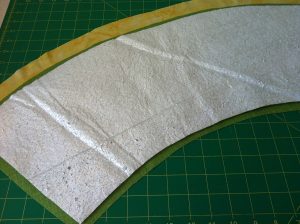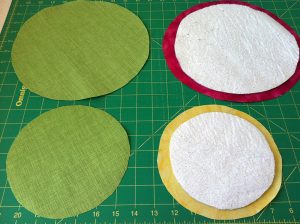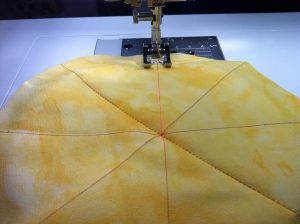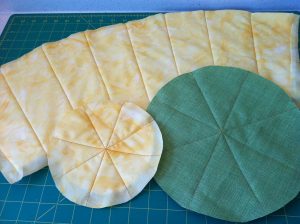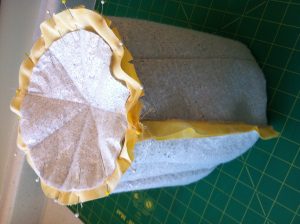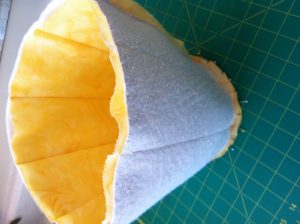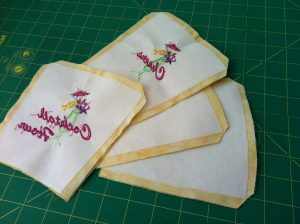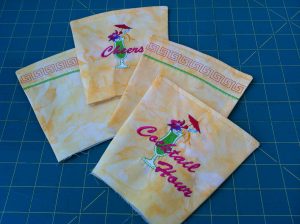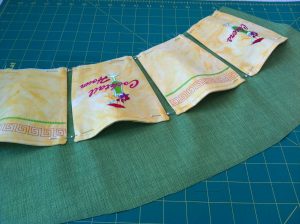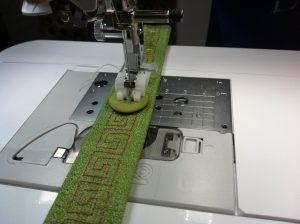[vc_row][vc_column][vc_column_text]Skill Level: Intermediate
Finished Measurements: 9″ (top diameter) x 6″ (bottom diameter) x 8″ (height)
Cutting and Sewing Time: 2 hours[/vc_column_text][/vc_column][/vc_row][vc_row][vc_column][vc_column_text el_class=”greytext”]For those long hot summer days, this insulated ice bucket cover was designed to keep favourite drinks ready for hours of entertaining. The handy pockets provide secure storage for napkins, straws, and all the extras. The handle makes it easy to carry to the pool or beach—and the cover keeps the heat out, and the ice frozen, for hours. Flip the lid for access to your fave chilled wine or cooler bottles.[/vc_column_text][/vc_column][/vc_row][vc_row][vc_column][vc_column_text]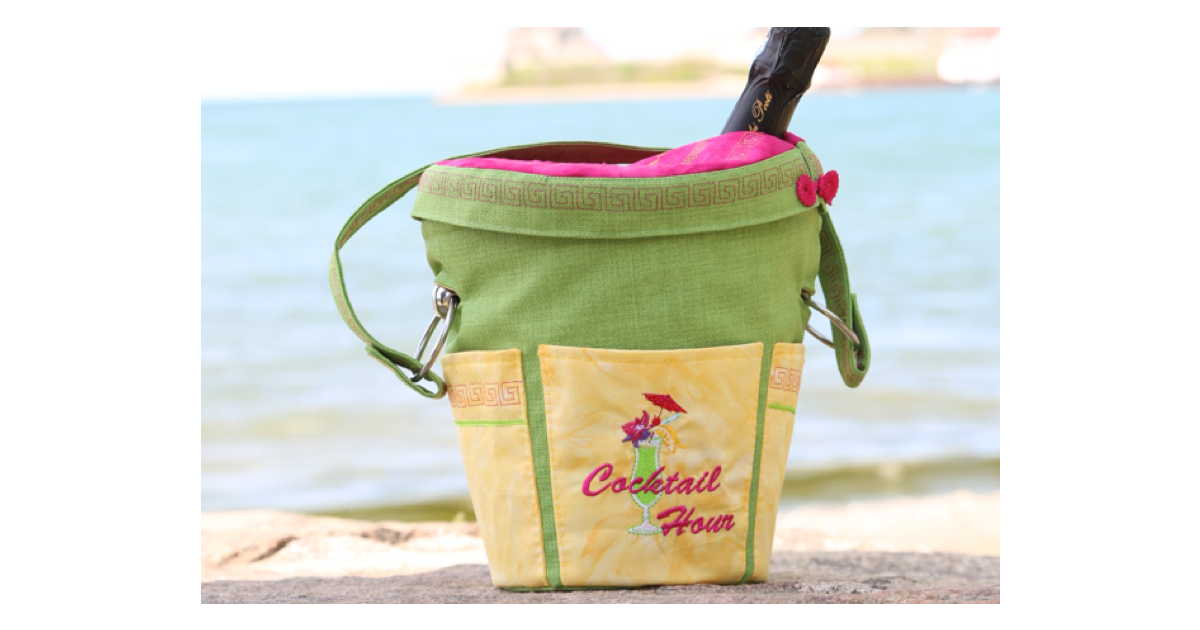
Supplies
• Brother Sewing and Embroidery Machine: DreamWeaver®XE VM6200D
• Circular Attachment (SACIRC1C)
• Embroidery Foot (included with the VM6200D)
• Zigzag Foot (included with the VM6200D)
• Monogramming foot (included with the VM6200D)
• Buttonhole Foot (included with the VM6200D)
• Brother 100% Polyester Embroidery and Bobbin Threads.
This machine features the patented Brother Sew Straight™ Laser Vision Guide, Droplight™ Embroidery Positioning Marker and V-Sonic™ Pen for sewing and embroidery.
Materials
Ice bucket
20″ [50cm] cover fabric
20″ [50cm] lining fabric
20″ [50cm] Thinsulate materials
4″ [10cm] Steam-a-Seam
26” x 1” [66 x 2.5cm] batting
39″ [1m] paper for pattern
39″ [1m] Brother SA520 tear-a-way stabilizer for embroidery and decorative stitching
Embroidery machine needles size 80 or 90
Sewing thread to match fabric
Embroidery/bobbin threads
Fray Check
Scissors
Marking tools
Pins
2 x 20mm buttons
Creating the pattern
1. Position the top of the bucket upside down on paper and draw the circle. Repeat for the bottom. Add a seam allowance of ⅝″ [16mm] around the drawn circles.
2. If your bucket is like the one used for the sample, larger at the top, wrap paper once around the bucket and trim to size of bucket adding ⅝″ [16mm] seam allowance on all sides.
3. Use the bucket pattern piece to create pockets by reducing the height of pattern to the desired height (5″ [12.5cm] is the height of the pocket in the sample).
4. Divide the pattern piece into number of pockets desired, four were used for the sample. Cut two pieces of lining fabric for each pocket.
Cutting
1. From cover fabric, cut:
• bucket cover
• large circle
• small circle
• handle band 3¾″ x 26″ [9.5 x 66cm]
• lid band 2¼″ x 29¾″ [5.5 x 75cm]
• outside fabric
• 4 pockets
2. Except for the lid band, cut the above pieces from lining fabric.
3. Cut bucket cover, large circle, small circle from Thinsulate fabric. Trim ½” [12mm] from all sides to reduce seam bulk.
Sewing
Bucket Lining
1. Fold circles and bucket lining in half 3 times to make 8 equal parts, excluding the seam allowance. Mark lines for sewing reference or use the laser sewing guide to follow creases.
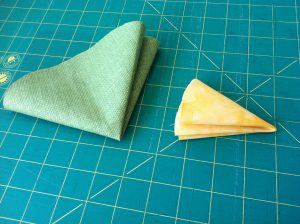
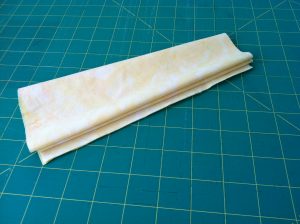
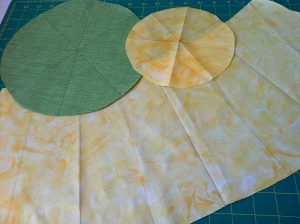
2. Lay the Thinsulate fabric on the wrong side of lining, shiny side up. From the right side, sew the lining to the Thinsulate using the laser guide to follow the creases.
3. Stay-stitch lower edge of bucket lining ½” [12mm] from edge, with 2mm stitch.
4. With Right Slides of lining together, sew side seam of lining leaving 4” – 5” [10 – 12cm] opening for turning.
5. Right Sides together, use the stitch lines as a guide to pin the smaller circle to bottom of bucket lining, sew on using ½” [12mm] seam allowance. Snip to stitch line to ease in fullness on bucket lining. Left align the needle to ease sewing.
Pockets
1. Embroider designs on fabric before cutting out.
2. Right Sides together, sew both sides and top of pockets with ¼″ [6mm] seam. Leave small curve open on bottom. Clip corners diagonally, turn and press.
3. Topstitch top edge of pocket. Note: Take this opportunity to use decorative stitches from your sewing machine with embroidery thread or heavier threads for that personalized look. Create your own stitches with the Brother Create a Stitch. For the sample, designs #6-003 and #6-047 decorative stitches and cocktail glass embroidery from preloaded designs on the Dreamweaver XE. were used.
4. Pin pockets to lower edge of bucket cover aligning bottom edge. Pin top edges of pocket inward to create a little give for access to the pockets. Position pockets at least ½” [12mm] from sides to allow for the side seam of cover.
5. Stitch sides of pockets to bucket cover. The blanket stitch used for the sample is 3.5mm wide and 1.8mm long. If you have a mirror image, just flip the stitch to come down the other side.
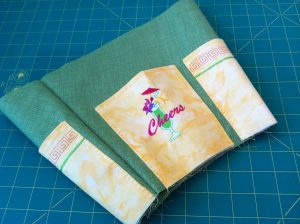
6. Stay-stitch the bottom of the pockets to the bottom of the cover ¼″ [6mm] from edge.
Bucket Cover
1. Right sides together, stitch the side seam of the bucket cover.
2. Pin the bottom circle to the bottom of bucket cover. Stitch with ½” [12mm] seam, clipping the cover edge to fit.
3. With Right sides of lining together, stitch around top edge and turn inside-out through lining. Stitch opening closed. Push lining into bucket cover and topstitch upper edge.
For buckets with rings on the sides, follow the next steps to create openings. It’s recommended to make a sample first.
1. Cut two 3” x 4” [7.6 x 10.2cm] pieces of lining and apply Steam-a-Seam to the wrong side of each piece. Steam-a-Seam should be same size as lining piece. With pinking shear, finish off all sides of each piece.
2. Draw a line the width of ring in the centre of piece on the paper side and draw a stitching line rectangle around line. The opening in the sample is 2” [5cm] long and ¼″ [6mm] wide.
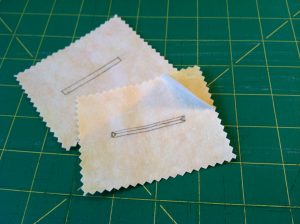
3. Position this piece with Right sides together on outside of bucket at the same location as rings.
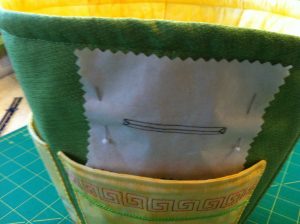
4. Reduce your stitch length to 1mm to allow precise stitching. Stitch around marking on piece, pivoting at all corners. Note: If you have directional sewing on your machine, slip the bucket on the free arm and sew rectangle without turning bucket.
5. Remove the paper from the Steam-a-Seam. Trim through all layers with Y slits at each corner. Push the piece through to the inside of the bucket.
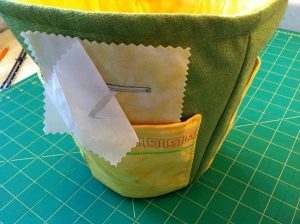
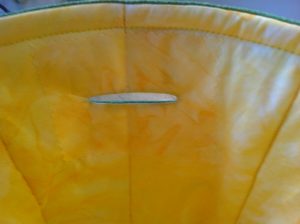
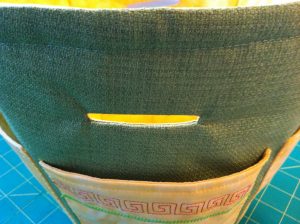
6. Check to see if the ring will pass through the hole before pressing down the inside piece to the lining and topstitch around opening. You can make it bigger at this point if necessary. Lengthen the stitch before top stitching. (Practice on a sample first.) Press the piece to the inside. inside. Be careful as the Thinsulate retains the heat from the iron.
Handle
1. Right sides together, lay a 1” [2.5cm] piece of batting along strip and stitch ½” [12mm] seam closing ends and along the sides, leaving an opening for turning. Turn right-side out and press.
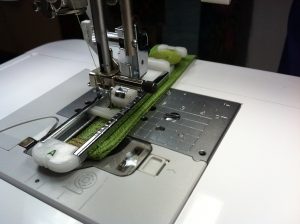
2. Topstitch edges or use decorative stitch down centre to secure batting. Stitch buttonhole on each end of the handle to attach to rings with buttons.
Note: It’s recommended to apply Fray Check to the buttonhole. Let it dry before cutting opening to prevent frayed edges.
3. Position the handle through rings and mark button positions.
4. Use a buttonhole foot to sew on buttons.
Cover
1. The lid was embellished with the circle attachment and decorative stitches prior to construction using the following on the circular attachment:
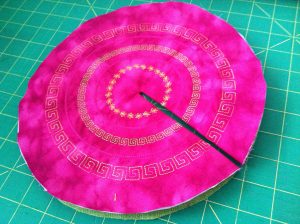
Stitch #6-057 at position 30
Stitch #6-003 at position 45
Stitch #7-024 at position 60
Stitch #6-047 at position 90
2. Use tear-a-way under fabric to stabilize the stitches.
3. With Right sides together, stitch close to the segment line, with 1.5mm stitch from edge to centre. Turn, and return on other side of segment line. Cut segment line and turn fabric inside-out.
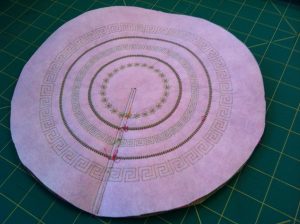
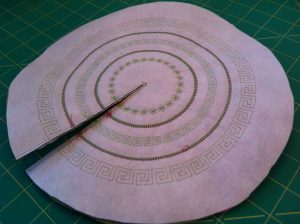
4. Right sides together, sew ½” [12mm] seam at each end of banding. Pin the right sides of banding and lid starting at split and continue around to other side of split.
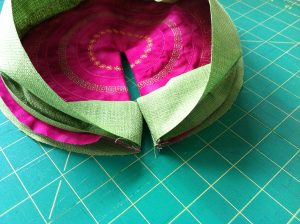
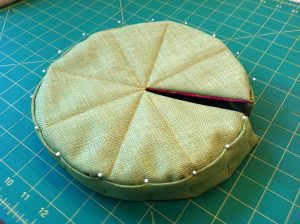
5. Stitch together using a ½” [12mm] seam. Turn banding to right side and press all raw edges to the band side. On right side, topstitch ¼″ [6mm] from seam on band side on three sides. Stitch #6-047 was used to embellish the band prior to sewing. The embroidery frog used to close the lid is one of the many loaded embroideries in the Dreamweaver XE.
Assembly
1. Position the bucket inside the cover.
2. Slide the rings through the openings.
3. Attach the handle and lid. Fill with ice and enjoy!
Instruction photos courtesy of Cathie Schnarr[/vc_column_text][/vc_column][/vc_row]
Embroidery, Sewing | 0 (s)